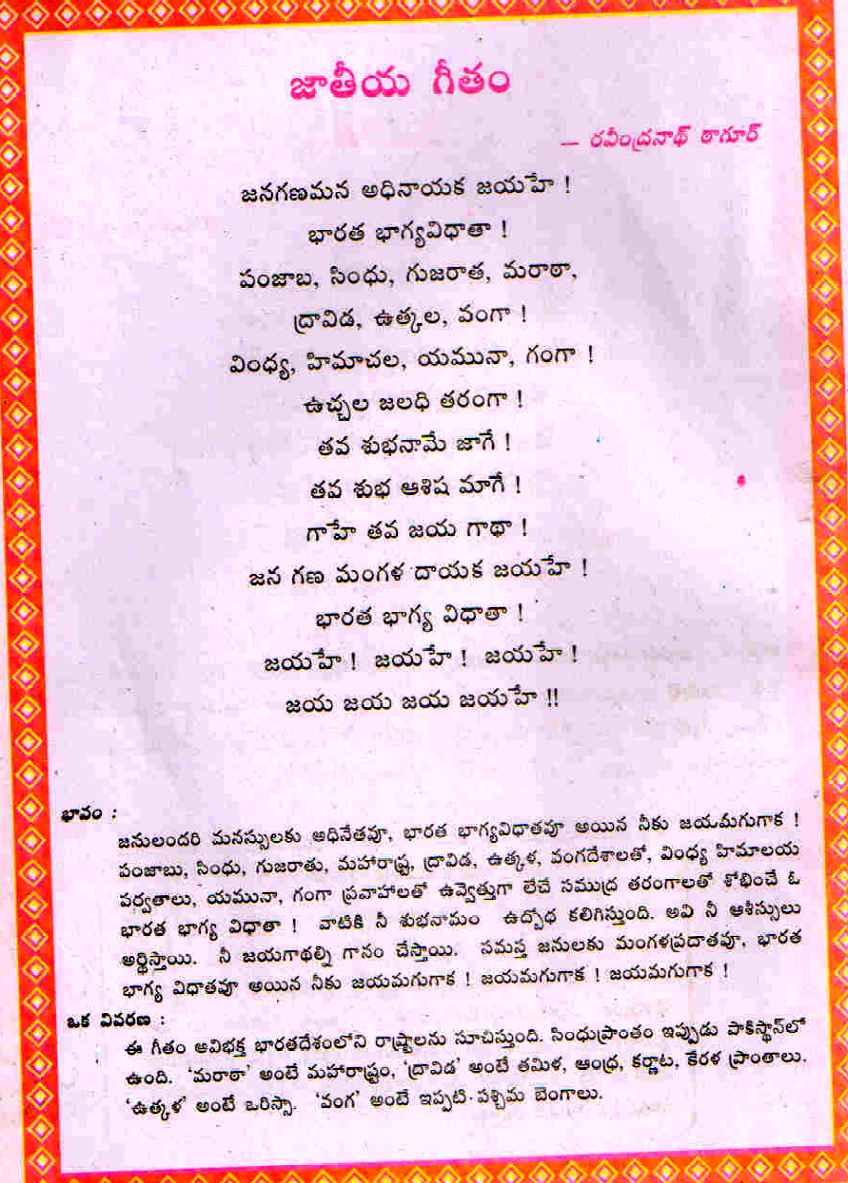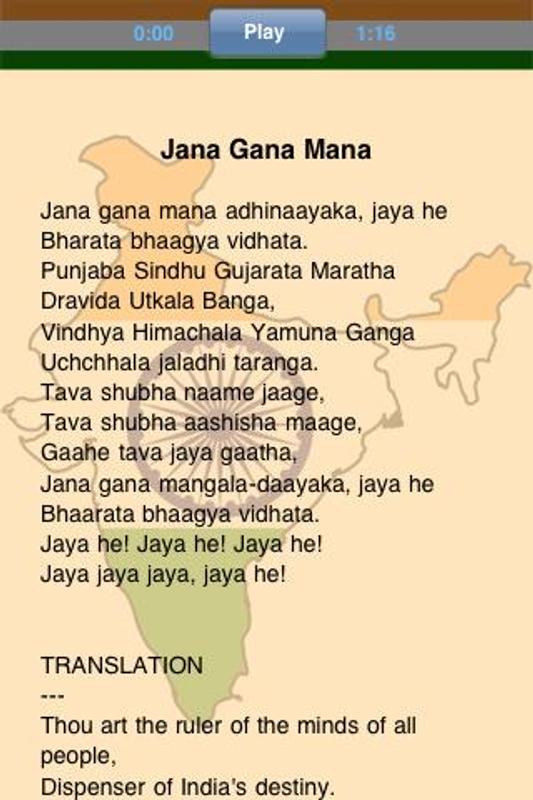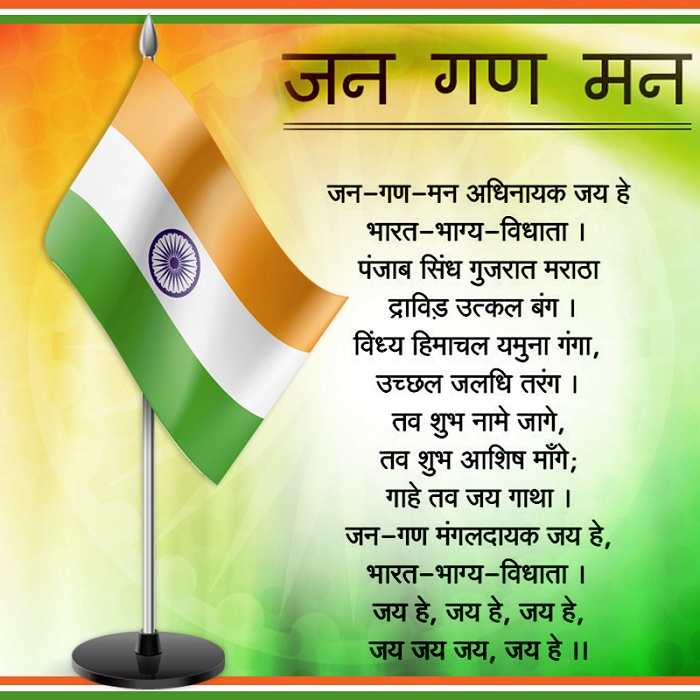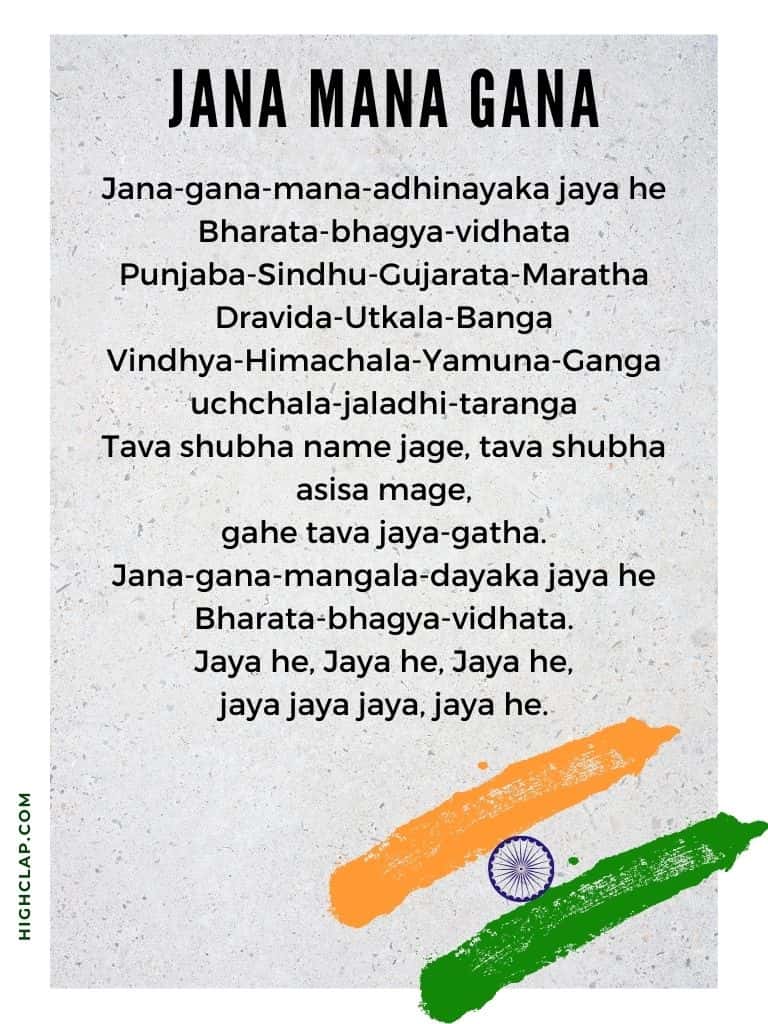
TELUGU WEB WORLD INDIAN NATIONAL ANTHEM JANA GANA MANA AND ITS MEANING IN TELUGU EVERY
National anthem (Jana-gana-mana) was originally composed by Rabindranath Tagore in Bengali. The Hindi version of the national anthem was adopted in 1950 on 24 th of January by the Constituent Assembly. The lyrics and music of the national anthem was given by Rabindranath Tagore in 1911.

Jana Gana Mana Song Meaning In Tamil
The national anthem of India, "Jana Gana Mana," is sung on many occasions, but particularly on two national holidays —Independence Day (August 15) and Republic Day (January 26). The song includes the lyrics and music of the first stanza of the Nobel laureate poet Rabindranath Tagore 's " Jana Gana Mana, " written in praise of India.

NATIONAL ANTHEM INDIA JANA GANA MANA AND ITS WORDS MEANING IN TELUGU
Whenever someone plays or sings the national anthem of India, no matter where we are, we all come together, stand at attention, salute, and chant 'Jana Gana Mana'. The national anthem is the pride of India and Indians are proud of it. Composed by Nobel Laureate Rabindranath Tagore, the anthem highlights India's national heritage and demonstrates patriotism and loyalty to one's country.

JANA GANA MANA meaning in Hindi By Yugansh Reporter Hindi YouTube
Jana Gana Mana is the national anthem of India. It is writtern Sanskritized Bengali, it is composed and scored by Nobel laureate Rabindranath Tagore. Jana Gana Mana was officially adopted as the Indian national anthem on January 24, 1950. A formal rendition of the national anthem takes fifty-two seconds.

Jana Gana Mana Lyrics in English (Facts and History of National Anthem of India) Social Talky
Jana Mana Gana Meaning - English Translation: History of Jana Gana Mana Significance of Jana Gana Mana Code of Conduct: Facts About Jana Gana Mana Lyrics : Rabindranath Tagore Music : Rabindranath Tagore Written on : December 11, 1911 First sung on : December 27, 1911 Declared as National Anthem on : January 24, 1950 Time to play : 52 seconds

Jana Gana Mana for Android APK Download
"Jana Gana Mana" is the national anthem of India. Written in highly Sanskritised (Tatsama) Bengali, the first of five stanzas is a Brahmo hymn composed and scored by Nobel laureate Rabindranath Tagore. The poem seems to focus on the regional factors or aspects of India.

Jana Gana Mana National Anthem Meaning in Tamil ஜன கண மன அர்த்தம் தெரியுமா? தேசிய கீதம்
The National Anthem of India is titled "Jana Gana Mana". The song was originally composed in Bengali by India's first Nobel laureate Rabindranath Tagore on 11 December 1911. [12] [13] [14] The parent song, ' Bharoto Bhagyo Bidhata ' is a Brahmo hymn that has five verses and only the first verse has been adopted as the national anthem.

Jana Gana Mana India National Anthem Hindi English lyrics YouTube
In 1942, 'Jana Gana Mana' was performed (not sung) for the first time in Hamburg. The Jana Gana Mana was declared as India's National Anthem on 24th January 1950. The official version of the National Anthem of India should take 52 seconds by law, and not 54 seconds. In 2015, Rajasthan Governor has demanded to replace the word.

Jana Gana Mana English Lyrics deepazgard
Jana Gana Mana, written by Nobel Prize winner Rabindranath Tagore, emphasises the spirit of pluralism or, in more common parlance, the idea of "Unity in Diversity," which is at the heart of India's cultural legacy. PTI The hymn begins with an adoration of the Almighty, who determines the fate of the nation: Jana-gana-mana-adhinayaka jaya he

Top 179 + India’s national animal in hindi
To begin with, India's national anthem, Jana Gana Mana Adhinayaka, was written by Rabindranath Tagore in honour of King George V and the Queen of England when they visited India in 1919. To honour their visit Pandit Motilal Nehru had the five stanzas included, which are in praise of the King and Queen. (And most of us think it is in the praise.

Jana gana mana meaning in telugu The Truth Behind Jana Gana Mana in telugu Tasty fruit YouTube
Rabindranath Tagore's song, Jana-gana-mana was adopted by the Constituent Assembly as the National Anthem of India on 24 January 1950. The first stanza constitutes the full version of the National Anthem. It reads: Jana-gana-mana-adhinayaka Jaya he Bharat-bhagya-vidhata Punjaba-Sindhu-Gujarata-Maratha Dravida-Utkala-Banga Vindhya-Himachala.

Jana Gana Mana Tamil Movie Overview Gambaran
Mana = Mind Adhinayaka= Leader Jaya He = Victory Bharata = India Bhagya = Destiny Vidhata = Disposer Punjaba = Punjab Sindhu = Indus Gujarata = Gujarat Maratha = Marathi Maharashtra Dravida = South Utkala = Orissa Banga = Bengal Vindhya =Vindhyas Himachal =Himalay Yamuna = Yamuna Ganga = Ganges Uchchhala = Moving Jaladhi = Ocean Taranga = Waves

Meaning of Janaganamana Politics and Daily News Nandamuri Fans Discussion Board
Jana Gana Mana is the national anthem of India originally written in Bengali, by Nobel laureate Rabindranath Tagore. This essay takes a look at its history, evolution, lyrics, meaning and translation. Cultural India : National Symbols : National Anthem of India National Anthem Title: Jana Gana Mana Music by: Rabindranath Tagore

Jana Gana Mana English Translation greenwayness
जय जय जय जय हे! [7] Thou art the ruler of the minds of all people, Dispenser of India's destiny. Thy name rouses the hearts of Punjab, Sindh, Gujarat and Maratha, Of the Dravida and Odisha and Bengal; It echoes in the hills of Vindhya and the Himalayas, Mingles in the music of Ganga and Yamuna and is chanted by The waves of the Indian sea.

Jana Gana Mana जन गण मन Indian National Anthem Lyrics Free Nude Porn Photos
Little did anyone know that the original anthem composed by India's wordsmith Ravindranath Tagore had 4 more verses to it. Now, in a tribute to this great po.

Jana Gana Mana Tamil Movie Overview Gambaran
Why is August 15 India's Independence Day? Britain ruled India for nearly two centuries but its military and economy were exhausted by the Second World War as anti-colonial movements began to challenge empires.